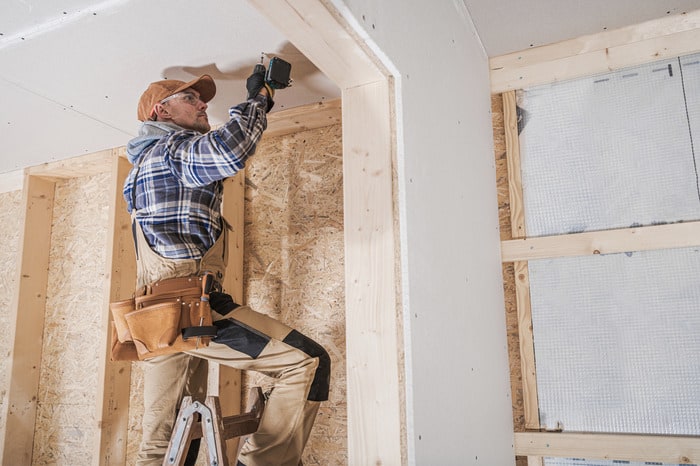Recently, Canada has seen a rising demand for skilled tradespeople. The combination of several factors, including an aging population, a growing economy, and an increasing need for skilled labor in various industries, paved the way for this stronger demand. Thus, if you’re looking to build a lucrative career, taking trade courses might be your best bet!
Aside from the demand, and probably because of it, skilled tradespeople earn good salaries, with an average pay range of CAD$59,000 to $105,000 in Canada. To top this off, this line of work also promises better job satisfaction, professional growth, and security.
The good news is that the education, skills, and experience you need are within close reach! All you need to do is take the first step, which is to sign up for a skilled trade course aligned with your interests.
If you want to know more about skilled trade courses to pursue in Canada that would help you get that big break in the industry, continue reading this blog.
-
Carpentry
First on the list of promising career paths to pursue is carpentry, which is both high-paying and in-demand because of the booming construction industry in the country. Carpentry courses in Canada are designed to provide theoretical knowledge and practical skills students need to succeed in the industry.
The length and specific focus of carpentry courses can vary depending on the institution and the level of training, but they typically cover a wide range of topics, including:
- Carpentry fundamentals
- Layout and measurement
- Framing
- Finishing
- Cabinetmaking
Carpentry courses also include hands-on training in workshops where they practice using tools and techniques to build projects. One good example is the home renovation program at the Skilled Trades Colleges in Canada. In this 12-week course, students will collectively build a 1000-square-foot house, complete with finishings.
With proper focus and guidance from qualified instructors, you’ll be well on your way to becoming a certified carpenter in your area.
-
Bricklaying and masonry
Bricklaying and masonry are great career paths for people interested in working with their hands and creating beautiful structures. However, there are some differences between the two trades that you should consider before making a decision.
Bricklaying involves laying bricks to create walls, structures, and other architectural elements. Bricklayers typically work on commercial and residential construction projects. Meanwhile, masonry is a broader term that encompasses bricklaying, stonework, and other types of construction using concrete blocks or other materials. They may also specialize in stonework or decorative concrete.
Should you decide that either of these paths is right for you, you’ll also have to go through training and qualification processes like in other trades. You’ll also need a high school diploma, go through apprenticeships, and pass the journeyperson certification.
-
Heating, refrigeration, and air conditioning systems
Whether or not you should train to become an HVAC technician depends on your interests, skills, and career goals. HVAC technicians are in high demand in Canada, and they earn good salaries, too.
If you’re interested in a challenging yet rewarding career, becoming an HVAC technician could be a good option for you. You can take many different training courses to become one, including apprenticeships, vocational training programs, and college degrees.
-
Electrical techniques
The courses you must take to become an electrician in Canada will vary depending on your province or territory. However, some general requirements are common across the country.
Most regions will require you to have a high school diploma or equivalent to become an electrician. Some may also require a specific grade 12 math or English credit. Meanwhile, you can get pre-apprenticeship training programs from various areas for one to two years.
Being an apprentice is the most common way to become an electrician in this country. Apprenticeships typically take four to five years to complete and involve on-the-job training and classroom instruction.
After completing your apprenticeship, you must pass a journeyperson certification exam to become a licensed electrician. The journeyperson certification exam is administered by province or territory. Usually, this test covers topics such as electrical safety, electrical theory, and the Canadian Electrical Code.
-
Plumbing and pipefitting
If you want to hone your mechanical aptitude, problem-solving skills, manual dexterity, spatial awareness, and attention to detail, plumbing might be perfect for you! Plus, you get to help a lot of households in your community, which could add to your job satisfaction and personal fulfillment.
To become a plumber in Canada, you will typically need to complete a combination of high school education, pre-apprenticeship training, and an apprenticeship. Like electricians, you must also pass a journeyperson exam to get your license.
Specific requirements and course offerings may vary depending on your province or territory. That said, it’s always advisable to check with your local apprenticeship authority or educational institutions for the most up-to-date information.
These are just a few of the many in-demand skilled trades in Canada. With a strong job market and a growing economy, there are plenty of opportunities for skilled workers in this country.
In Summary
Skilled trades offer not only financial rewards but also the promise of job satisfaction, professional growth, and security. By gaining expertise in the in-demand trade courses discussed above, individuals can secure fulfilling careers while contributing to the nation’s economic growth. Fortunately, the accessible education and hands-on experiences make these paths promising and attainable for those looking for opportunities in Canada’s thriving sector.

